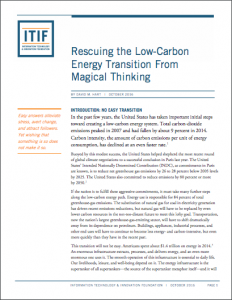Full Title: Rescuing the Low-Carbon Energy Transition From Magical Thinking
Author(s): David M. Hart
Publisher(s): Information Technology and Innovation Foundation
Publication Date: November 1, 2016
Full Text: Download Resource
Description (excerpt):
In the past few years, the United States has taken important initial steps toward creating a low-carbon energy system. Total carbon-dioxide emissions peaked in 2007 and had fallen by about 9 percent in 2014. Carbon intensity, the amount of carbon emissions per unit of energy consumption, has declined at an even faster rate.
Buoyed by this modest success, the United States helped shepherd the most recent round of global climate negotiations to a successful conclusion in Paris last year. The United States’ Intended Nationally Determined Contribution (INDC), as commitments in Paris are known, is to reduce net greenhouse gas emissions by 26 to 28 percent below 2005 levels by 2025. The United States also committed to reduce emissions by 80 percent or more by 2050.
If the nation is to fulfill these aggressive commitments, it must take many further steps along the low-carbon energy path. Energy use is responsible for 84 percent of total greenhouse-gas emissions. The substitution of natural gas for coal in electricity generation has driven recent emissions reductions, but natural gas will have to be replaced by even lower carbon resources in the not-too-distant future to meet this lofty goal. Transportation, now the nation’s largest greenhouse-gas-emitting sector, will have to shift dramatically away from its dependence on petroleum. Buildings, appliances, industrial processes, and other end uses will have to continue to become less energy- and carbon-intensive, but even more quickly than they have in the recent past.
